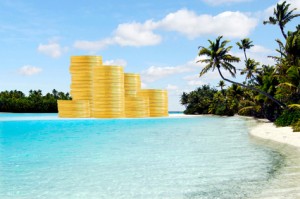
By David Rotfleisch
Rotfleisch & Samulovitch Professional Corporation
Special to the Financial Independence Hub
Imagine dad dies. The widow and children miss him terribly, but he made good money and they’ll be taken care of financially. What they don’t realize is that dad left them “black money.” He kept most of his money in a secret offshore bank account — black money —unreported to Canada Revenue Agency (CRA). He also left his heirs a big problem.
Governments and tax collectors around the world have come down hard on the banks that harbour secret accounts. The crackdown came after the terrorist attacks of September 11, 2001, as terrorist cells need financing and want to remain under the radar. That got the ball rolling worldwide. As well, governments began cracking down on money laundering from the proceeds of crime (drugs, guns, human trafficking, exotic animal parts smuggling, and so on).
A True Story
This is a true story, with the details changed a bit to protect the heirs from embarrassment. The widow called my firm, distraught and I was able to provide some comfort. It’s good news that the money is not lost forever. But it will take a while to get it back to Canada, and the family will have a Canada Revenue Agency tax bill to pay.
The best news is mom and the kids have no fear of going to jail for tax evasion. They can sleep at night.
 At my firm, 2015 started with a call from a Canadian businessman who spends part of his time outside Canada. He was given bad advice years ago by his Canadian stock broker to set up an offshore account. Now the offshore broker is getting out of business, has sold the portfolio and wired funds back to the businessman. But the offshore portfolio was never reported to CRA. The businessman recognizes his obligations, and we are doing voluntary disclosure to bring him onside, once again ending fear of criminal charges.
At my firm, 2015 started with a call from a Canadian businessman who spends part of his time outside Canada. He was given bad advice years ago by his Canadian stock broker to set up an offshore account. Now the offshore broker is getting out of business, has sold the portfolio and wired funds back to the businessman. But the offshore portfolio was never reported to CRA. The businessman recognizes his obligations, and we are doing voluntary disclosure to bring him onside, once again ending fear of criminal charges.
Voluntary Disclosures Program
Canada has long had a Voluntary Disclosures Program. If taxpayers come forward and disclose complete information about unreported income and unpaid taxes to the CRA before they are caught, there will be no prosecution for tax evasion and they will generally be granted partial interest relief; no monetary penalties will be applied to the amount of tax owed. Plus the process is confidential, reducing embarrassment.
The Israel Tax Authority announced a voluntary disclosure program in September 2014, similar to the Canadian program. Tax authorities around the world are finally effectively tackling offshore tax evasion, and the banks are their allies.
The CRA is turning up the heat on offshore accounts and unreported tax income from them. It issued letters to certain Canadian taxpayers in December 2014 to remind them of their filing obligation. The letter also reminded them of penalties and possible criminal prosecution, if they have not reported offshore assets and income of $100,000 or more.
Informants get 15% reward
The really interesting bit about the letter is how recipients were selected by the CRA: in other words, they may not have been randomly selected, but rather specifically targeted. Informants are offered a 15 per cent reward if they report those who have offshore money squirreled away through the Offshore Tax Information Program. At the same time, CRA stated that the voluntary disclosure option was still available for those taxpayers who received the letters.
Almost every day brings new evidence that the era of bank secrecy for tax evaders using the famous Swiss and “offshore” bank accounts in “tax havens” is over. Both tax authorities and banks are clamping down on unreported offshore accounts.
Early in 2014, the Swiss bank Credit Suisse agreed to pay fines of $2.6 Billion and settle with the US Department of Justice for helping US citizens evade tax. At year-end 2014, Bank Leumi (one of the largest banks in Israel) also settled with the U.S. Department of Justice and admitted to helping more than 1,500 U.S. account holders evade taxes; part of the settlement was to surrender their names to the U.S. authorities and to pay $400 million in fines.
The large Swiss banks are demanding their Israeli customers prove compliance with the Israel Tax Authority. In the past, Swiss banks UBS and Credit Suisse were the target of US and later European tax authorities in a stronger effort to fight international tax evasion.
Snitch Line rewards tipsters
Canadian taxpayers must be aware that CRA and countries around the world are beginning to note the success that anti-tax evasion focus is having, and both the tax authorities and major banks are starting to increase efforts to prevent taxpayers from hiding offshore assets. In early 2014 Canada implemented the CRA’s Offshore Tax Informant Program. This snitch line rewards tipsters who give the CRA information related to major international tax non-compliance that leads to the collection of taxes owing.
By 2018 Canada will join an agreement with 85 other countries including traditional tax havens such as Liechtenstein, the British Virgin Islands, and the Cayman Islands. The information being exchanged includes account balances, interest payments, and beneficial ownership. Today, nearly all financial transactions are electronic and authorities exchange voluminous amounts of information with just the click of a button.
Keeping an offshore account is not illegal. Not reporting the money to Canada and not paying your fair share of taxes is illegal.
In Canada, the assets kept offshore must be reported if the cost is more than $100,000. If CRA discovers these unreported assets or undeclared income, the individual may face harsh penalties including jail time, and civil and criminal financial penalties as well as full interest on the tax arrears and penalties.
The large recent fines on banks such as Bank Leumi and UBS have spooked other major international banks into imposing strict compliance requirements on their customers holding offshore accounts; some banks may freeze or close bank accounts that cannot prove they are compliant with the relevant tax authorities.
Banks are now allies of tax authorities worldwide
The takeaway from all this is that tax authorities around the world are finally effectively tackling offshore tax evasion and the banks are their allies. Canada is on the same path with its implementation of the Offshore Tax Informant Program and participation in the OECD transparency agreement. Now more than ever, Canadian taxpayers need to be aware that with rapidly increasing global transparency, bank secrecy for offshore accounts is no longer a lock. Worse, it’s a lock to which tax authorities now have skeleton keys.
David Rotfleisch, principal at Rotfleisch & Samulovitch Professional Corporation, is a tax lawyer and accountant. He has been helping clients deal with their tax issues with Canada Revenue Agency for more than 20 years. He can be reached at david@taxpage.com.

